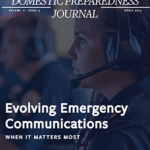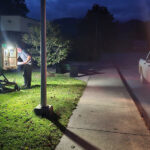Launched by Methodist minister William Booth and the East London Christian Mission in 1865, The Salvation Army provides services during both daily operations and times of disaster. More than just thrift stores and bell ringers, The Salvation Army provides small- and large-scale disaster relief – from house fires to major hurricanes. This “Army of Good” includes about 5,000 officers, 60,000 employees, and more than 1 million volunteers located in 26 countries and across the United States.
Following a disaster, The Salvation Army sends teams to evaluate the scope of the disaster, to develop a response plan, to request donations, and to work with governmental and other nongovernmental organizations to provide victim relief, feeding kitchens, and pastoral duties. Volunteer organizations are critical assets for disaster response, yet back-to-back disasters like the hurricanes and wildfires experienced in 2017 raise concern about donor and responder fatigue. Listen to this podcast and visit www.salvationarmyusa.org to learn more about this organization and its capabilities – a critical resource for all those responding to and affected by a disaster.

Andrew R. Roszak
Andrew Roszak, JD, MPA, EMT-P, serves as the executive director for the Institute for Childhood Preparedness and as an advisor for the Domestic Preparedness Journal. He is the author of the Preparing for the Unexpected Series of books, which includes “Preschool Preparedness for an Active Shooter.” He has spent over 20 years working on emergency preparedness, response, and recovery issues. He is admitted to the Illinois and District of Columbia Bars and is admitted to the Bar of the U.S. Supreme Court. Find him on Twitter: @AndyRoszak.
- Andrew R. Roszakhttps://domesticpreparedness.com/author/andrew-r-roszak
- Andrew R. Roszakhttps://domesticpreparedness.com/author/andrew-r-roszak
- Andrew R. Roszakhttps://domesticpreparedness.com/author/andrew-r-roszak
- Andrew R. Roszakhttps://domesticpreparedness.com/author/andrew-r-roszak

Michele Matthews
Lt. Colonel Michele Matthews is The Salvation Army national director for White House Relations. She has served alongside her husband, Ward, as a Salvation Army officer since their marriage in 1999. Between them, they have fulfilled appointments in Kentucky, Tennessee, Virginia, Oklahoma, Florida, North Carolina, Jamaica, and at The Salvation Army USA Southern Territorial headquarters in Atlanta, Georgia. She served as a commander of the Dallas-Fort Worth Metroplex, where she and Ward were responsible for more than 450 corporate partnerships, including the Dallas Cowboys, which has raised more than $2.2 billion over 21 years. She was also a founding officer of The Salvation Army’s Echelon organization, which provides a forum for young professionals to engage in their respective communities. It has since become the National Young Adult Auxiliary of The Salvation Army, with chapters across the country. She graduated with dual degrees in psychology and social services from Asbury College in Wilmore, Kentucky. She later received a Bachelor of Science nursing degree from Johns Hopkins University in Baltimore, Maryland. Further, she worked in the Medical Intensive Care Unit at the Veterans’ Hospital in Tampa, Florida, before being commissioned as a Salvation Army officer in 1999.
- This author does not have any more posts.

Ward Matthews
Lt. Colonel Ward Matthews is The Salvation Army national spokesperson and National Community Relations and Development secretary. During his more than 30-year tenure, he has served at all levels of The Salvation Army in the United States – including local, area, divisional, territorial, and national appointments. Most recently, he was the legal secretary for The Salvation Army Southern Territory. He served as a commander of the Dallas-Fort Worth Metroplex. He was also a founding officer of The Salvation Army’s Echelon organization, which has since become the National Young Adult Auxiliary of The Salvation Army, with chapters across the country. He has also served as a Salvation Army officer in Kentucky, Tennessee, Virginia, Oklahoma, Florida, North Carolina, and Jamaica. At the age of nine, he volunteered on a Salvation Army mobile kitchen with his father in the aftermath of Hurricane Camille. Since then, he has served in Jamaica after Hurricane Ike, in the Carolinas after Hurricane Floyd, at ground zero of the 1995 Oklahoma City bombing, and at the 9/11 World Trade Center attacks. He graduated Phi Beta Kappa with degrees in history and religion at Emory University before being commissioned as a Salvation Army officer in 1984. His Salvation Army heritage dates back five generations to the late 1800s.
- This author does not have any more posts.








